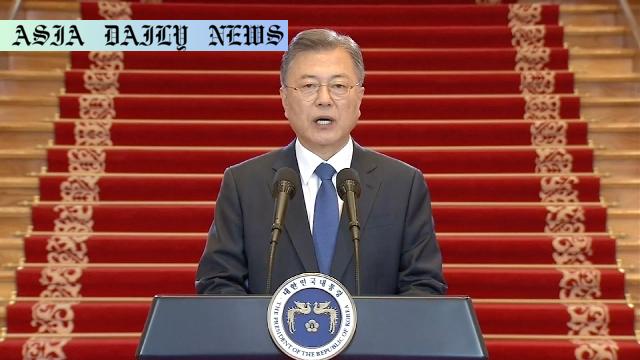Bribery: Former South Korean President Moon Jae-in indicted on charges of accepting $147K through questionable dealings.

Introduction to the Bribery Allegations
Former South Korean President Moon Jae-in is facing serious accusations of bribery, according to prosecutors overseeing the case. The indictment alleges that Moon accepted over 210 million won (equivalent to approximately $147,000) as part of a corruption scheme that spanned from August 2018 over a two-year period. The payments are said to have been channeled through his daughter’s ex-husband, who held an executive role at a now-defunct airline company established by a former lawmaker. While charges have been filed, Moon has not been detained, marking an ongoing and contentious case with significant political ramifications.
Details of the Accusations
The prosecutors highlighted that the funds in question were presented as a combination of salary and other payments to Moon’s daughter’s ex-husband. They allege that these transactions were part of a broader effort to curry favor with the Moon administration. The ex-lawmaker behind the company allegedly secured a lucrative appointment within a government-affiliated agency during Moon’s tenure, a move that has raised serious questions about political patronage and ethical governance.
North Korean Connection and Political Context
One of the central elements of the scandal involves the former lawmaker’s alleged push to establish a charter-flight service to North Korea. During Moon’s presidency, South Korean government policy extensively supported cooperative projects with North Korea, and such initiatives were seen as critical in fostering reconciliation efforts. Prosecutors suggest that the alleged bribe may have been aimed at ensuring government support for this endeavor, further complicating the geopolitical context of the accusations.
Political and Legal Repercussions
This indictment comes amidst increasing political division in South Korea, especially considering the proximity to the upcoming June presidential election. While Moon ended his term in 2022, he still enjoys widespread support within the Democratic Party of Korea. Political allies and supporters argue that the prosecution is politically motivated and intended to damage the credibility of the opposition party. These circumstances underline the deep fissures and challenges within South Korea’s political landscape.
The Broader Implications
The case highlights growing public concern over corruption and political accountability in South Korea. For years, the nation has grappled with corruption scandals involving high-ranking officials, and this case underscores the continued relevance of addressing ethical concerns in governance. Observers suggest that the outcome of this legal process could shape not only Moon’s legacy but also the broader trust in South Korea’s judiciary and political system.
Conclusion
The indictment of former South Korean President Moon Jae-in marks a pivotal moment in South Korea’s political and legal history. As the investigation unfolds, it will certainly be closely monitored by both local and international observers. The case serves as a stark reminder of the importance of transparency and accountability, particularly in leadership roles. Whether the allegations stand or not, the outcome will have a lasting influence on public trust in government and the nation’s political future.
Commentary
The Complexity of High-Level Corruption Cases
The indictment of former South Korean President Moon Jae-in brings to light some of the numerous complexities and challenges associated with prosecuting high-ranking officials. At the crux of this case lies a web of intertwined motivations, from the alleged financial incentives to the broader political agendas at play. While the essence of democratic governance relies on maintaining accountability, the frequent involvement of past and present leaders in corruption scandals also raises the critical issue of systemic flaws within political frameworks.
Political Ramifications and Public Perception
One cannot discuss this case without considering its potential impact on South Korea’s political landscape. With the June presidential election right around the corner, the timing of Moon’s indictment could fuel public perceptions of political bias or judicial weaponization. Given Moon’s popularity among opposition voters, this case risks deepening divisions and polarizing public opinion even further. While critics contend that the charges may have merit, supporters argue they could undermine the functioning of opposition-led democratic processes.
The Global Implications of Governance Transparency
Corruption, as a barrier to progress, is not limited to South Korea. The world has seen many nations grappling with similar issues, and each case provides a learning opportunity for global governance. For South Korea, this particular indictment could either strengthen its resolve to pursue justice regardless of an individual’s stature or risk alienating public trust in the judiciary if perceived as unfair. The stakes are undeniably high, and the outcome will undoubtedly have ripple effects internationally.
Balancing Growth and Accountability
Moon’s administration was marked by significant milestones, especially its focus on fostering reconciliation with North Korea. However, scandals like these cast a shadow on the positive achievements of his leadership. It is important to strike a balance between recognizing accomplishments while ensuring accountability when suspected wrongdoing surfaces. Such legal pursuits also demonstrate the importance of addressing systemic issues to prevent recurrence in the future.
Final Thoughts
The indictment of Moon Jae-in is a poignant reminder that no individual, regardless of their position, should be above the law. By ensuring that due legal processes are followed and that justice is served transparently, South Korea has an opportunity to reaffirm its commitment to ethical governance. While this case unfolds, it begs the question: How can governments better safeguard against corruption while retaining public trust in leadership? Only time will tell, but this situation serves as a milestone moment for reflection and reform.


